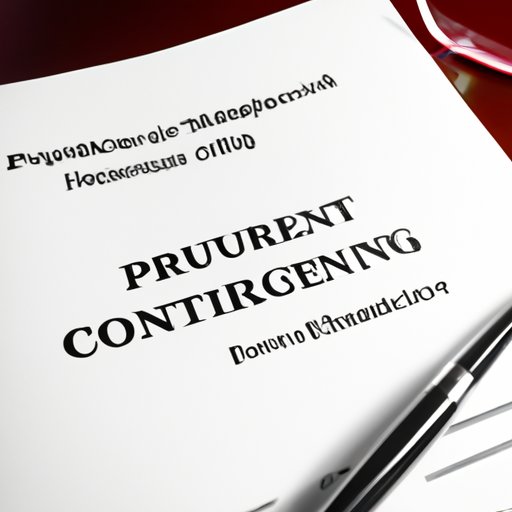Introduction
A prenuptial agreement, commonly referred to as a “prenup”, is a legally binding contract between two people who are about to be married. The agreement sets out the financial rights and responsibilities of each spouse in the event of a divorce or death. It is important to understand the basics of a prenup before entering into one, as they can be complex and require legal expertise to ensure they are valid and enforceable.
Explaining the Basics of a Prenuptial Agreement
When it comes to understanding prenuptial agreements, there are some key terms to be aware of. A prenup is a type of marital contract that is entered into prior to marriage, while a postnuptial agreement is one that is entered into after marriage. Both types of agreements are used to protect the financial interests of both parties, although the terms and conditions of each will vary depending on the individual circumstances.
Generally speaking, a prenup will cover a range of topics, including the division of assets and debts in the event of a divorce, spousal support payments, inheritance rights, and any other financial matters that may arise during marriage. It is also possible for a prenup to include non-financial provisions such as arrangements for childcare or pet custody.

Understanding the Benefits of a Prenuptial Agreement
There are several potential benefits to having a prenup in place. Firstly, it can provide protection for existing assets and prevent them from being divided in the event of a divorce. Secondly, it can specify which spouse is responsible for certain financial obligations, such as credit card debt or student loans. Thirdly, it can clarify inheritance issues, ensuring that each spouse’s wishes are respected in the event of death.
According to a study by the American Academy of Matrimonial Lawyers, prenups have become increasingly popular over the last decade, with nearly 70% of surveyed attorneys reporting an increase in prenup requests during this period.

Discussing the Legal Requirements for a Valid Prenuptial Agreement
In order for a prenup to be valid and enforceable, it must meet certain legal requirements. Each state has its own set of laws governing the validity of prenuptial agreements, so it is important to consult a lawyer who is knowledgeable about the specific requirements in your state. Generally speaking, a valid prenup must be in writing and signed by both parties, and it must be fair and equitable to both parties at the time it is signed.
It is also important to note that both parties should have legal representation when entering into a prenup. This ensures that each party fully understands their rights and obligations under the agreement, and that all the necessary steps are taken to make the agreement valid and enforceable.

Examining the Potential Pitfalls of a Prenuptial Agreement
While prenuptial agreements can be beneficial in some cases, they also come with some potential pitfalls. One of the main drawbacks is that they lack flexibility, as they typically cannot be modified or amended once they are signed. This can be problematic if the couple’s circumstances change significantly over the course of the marriage.
Another potential issue with prenups is that they can be unfair to one spouse if the terms are not properly negotiated. For example, if one spouse has significantly more assets than the other, the agreement may favor the wealthier spouse. Therefore, it is important to ensure that both parties have access to legal advice and that the terms of the agreement are fair and reasonable.
Comparing and Contrasting Traditional Marital Agreements to Prenuptial Agreements
Another option for couples looking to protect their financial interests is a traditional marital agreement, also known as a postnuptial agreement. These agreements are similar to prenups in that they set out the financial rights and responsibilities of each spouse in the event of a divorce or death. However, there are some key differences between the two types of agreements.
For example, prenups are typically more detailed and comprehensive than postnuptial agreements, as they are designed to be in place prior to marriage. In addition, prenups are generally easier to enforce than postnuptial agreements, as the latter often require additional evidence to prove their validity.
Conclusion
A prenuptial agreement is an important legal contract that sets out the financial rights and responsibilities of spouses in the event of divorce or death. This article has provided an overview of what a prenup is and how it works, as well as the potential benefits and pitfalls. It is important to seek legal advice before entering into a prenup, and to ensure that the terms of the agreement are fair and equitable to both parties.
Finally, it is important to understand the differences between prenuptial agreements and postnuptial agreements, as the two are distinct and have different enforcement considerations. Ultimately, a prenup can be a valuable tool for protecting the financial interests of both spouses, but it is important to seek legal advice to ensure that the agreement is valid and enforceable.
(Note: Is this article not meeting your expectations? Do you have knowledge or insights to share? Unlock new opportunities and expand your reach by joining our authors team. Click Registration to join us and share your expertise with our readers.)
